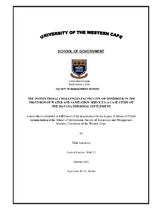| dc.contributor.advisor | Davids, G | |
| dc.contributor.author | Amutenya, Tekla | |
| dc.date.accessioned | 2021-03-16T14:33:16Z | |
| dc.date.available | 2021-03-16T14:33:16Z | |
| dc.date.issued | 2020 | |
| dc.identifier.uri | http://hdl.handle.net/11394/7975 | |
| dc.description | Masters in Public Administration - MPA | en_US |
| dc.description.abstract | This study examined the institutional challenges facing the City of Windhoek in the
provision of water supply and sanitation in the Havana Informal Settlement. Like most cities
in developing countries, Namibia is faced with the triple challenge of poverty,
unemployment and inequality, even though Namibia after its liberation developed several
policies to ensure that equitable service delivery is provided to all its citizens.
Approximately 60% of the city’s population resides in informal settlements, with inadequate
and poor service delivery such as sanitation and water supply. External factors such as
climate change amongst others have a huge impact in a water-scarce country such as
Namibia on attaining the sustainability of water resources. | en_US |
| dc.language.iso | en | en_US |
| dc.publisher | University of the Western Cape | en_US |
| dc.subject | Informal settlement | en_US |
| dc.subject | Sanitation | en_US |
| dc.subject | Adequate Sanitation | en_US |
| dc.subject | Security of Tenure | en_US |
| dc.subject | Municipality | en_US |
| dc.subject | Policy | en_US |
| dc.title | The institutional challenges facing city of Windhoek in the Provision of water and sanitation services: a case study of The Havana informal settlement | en_US |
| dc.rights.holder | University of the Western Cape | en_US |

